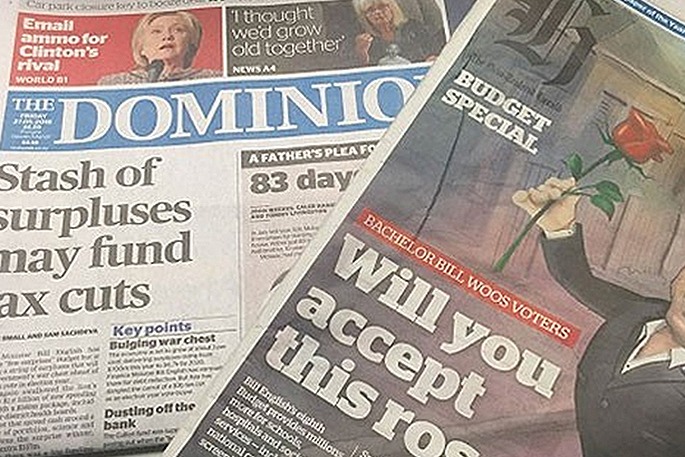The Court of Appeal has upheld a decision not to allow Stuff Ltd and NZME to merge.
The full judgment has not yet been publicly released, but the court said in a public "minute" that the companies' appeal against a Commerce Commission block on their merger had been dismissed.
NZME and Stuff Ltd have been ordered to pay the costs of the appeal.
NZME and Stuff Ltd originally proposed in 2016 that Stuff Ltd (then known as Fairfax Media) would be folded into NZX-listed NZME, with Stuff's Australian owner Fairfax Media in return receiving a 41 per cent stake in the combined business plus $55 million cash.
The media companies argued that the merger was vital for the ongoing viability of their news businesses, with Fairfax managing director Greg Hywood warning that a rejection of the plan could lead to deep cuts in journalism and the closure of some newspaper titles.
After public hearings the Commerce Commission ruled against the merger in May, 2017, arguing in its decision that "this merger would concentrate media ownership and influence to an unprecedented extent for a well-established modern liberal democracy".
The companies appealed that to the High Court at a hearing in October, 2017, and when that was unsuccessful took their case to the Court of Appeal, which considered the arguments in June.
In an email to staff, Stuff chief executive Sinead Boucher says the two companies sought the merger because they believed a combined business would ensure the delivery of "high quality independent journalism at scale for all New Zealanders.
"We believe the Commerce Commission's decision (which was upheld by the High Court) not to authorise the merger was wrong in fact and in law, which was why we appealed to the Court of Appeal.
"The decision is not the outcome we had hoped for, but, as everyone will be aware, we have not been sitting around idly waiting for it.
"The process has spanned more than two years, and in the meantime we have forged ahead with our own strategy of growing our Stuff and Neighbourly platforms, and new digital ventures, complemented by a strong portfolio of newspapers and magazines," says Sinead.
Earlier this year, Stuff moved to close or sell 28 community and rural titles as part of its plan to reposition the business in the face of far-reaching changes to the media market.
Meanwhile, a separate proposal is under way in Australia for broadcaster Nine to effectively take over Fairfax Media's operations. The intentions for Stuff if that plan proceeds are unclear.
The Commerce Commission welcomed the ruling.
Meanwhile Better Public Media Trust has welcomed the Court's decision saying it believes it is ‘absolutely right'.
It says allowing the merger to proceed would have seen the formation of a huge news media operation controlling 90 percent of the daily print news market, half the commercial radio sector and two of the nation's largest news websites.
BPM Chair and Victoria University senior lecturer in media, Peter Thompson says it is a relief the Court of Appeal has upheld the Commission's earlier ruling.
'Fairfax and NZME had put forward a quite cynical argument that non-quantifiable factors such as plurality and editorial independence could not be taken into consideration under the Commerce Act. The latest ruling underlines the fact that the Act is there to protect the interests of the New Zealand consumer, not the interests of corporate shareholders."
BPM nevertheless believes the Commerce Act needs to be reviewed in order to protect the public interest, especially in regard to an increasingly complex media ecology.
"This kind of merger proposal would have been unthinkable in most other countries. New Zealand's weak legislation invites big media companies to hire teams of lawyers and economic experts to try to push through legal rulings that are against the public interest," says Peter.
However, BPM does recognise the problem that NZME and Stuff said was the primary reason for the merger - that the print news media are under threat because nothing has been done to redress the impact of online media like Google and Facebook on the news sector's business models.
"One of the main reasons NZME and Stuff wanted the merger was because their revenue streams have been eaten away by digital intermediaries, which co-opt online traffic and advertising dollars, but invest nothing back into content production. New Zealand needs a regulatory framework that can solve this problem while protecting the public's democratic and cultural interests."
BPM therefore calls on Kris Faafoi in his dual role as Minister of Broadcasting, Communications and Digital Media as well as Consumer Affairs, to review New Zealand's competition law and to look at ways of ensuring that online intermediaries which exploit NZ media content contribute to the provision of that content.
One option which BPM has suggested previously, would be a marginal levy on online advertising which could then be redistributed to NZ content providers.
-Additional reporting Stuff.co.nz



0 comments
Leave a Comment
You must be logged in to make a comment.